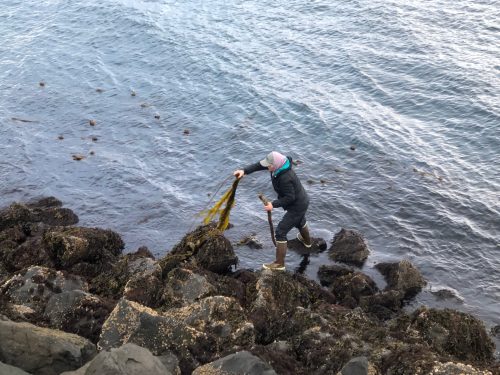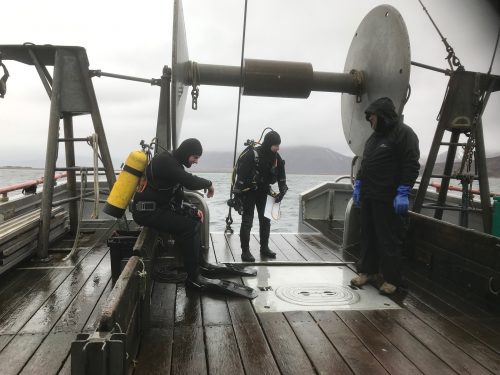Research will help seaweed farming and traditional aquaculture
September 26, 2019
Paula Dobbyn
907-274-9698
ÐÓ°Épro Sea Grant and the will partner on a project to launch a pilot seaweed farm near Sand Point on the ÐÓ°Épro Peninsula, with a $99,800 grant from National Sea Grant, part of the . Melissa Good, ÐÓ°Épro Sea Grantâs Marine Advisory agent in Unalaska, will lead the project in coordination with Charlotte Levy of the Aleutians East Borough. Community members and high school students will receive training to help set up and run the farm.

Developing a seaweed or kelp industry is a priority for the region to help diversify an economy centered on commercial fishing and processing.
âThis could be a valuable off-season opportunity for our fishermen to have supplemental income,â said Levy, natural resource assistant director for the Aleutians East Borough.
The region includes thousands of miles of pristine coastline and is ideal for kelp farming. It has naturally occurring kelp, a workforce with transferable skills and equipment, existing infrastructure and proximity to processing facilities, Levy said.
âSand Point will be the first location, but other potential farm sites will be considered in communities like Akutan and False Pass,â said Good.
ÐÓ°Épro Sea Grant is also part of a new $587,000 grant to jump-start a cross-Pacific regional collaborative hub. The regional hub will integrate research, outreach and education on traditional indigenous aquaculture like fish ponds in Hawaiâi and clam gardens in the Pacific Northwest. Washington Sea Grant is leading the project, working with ÐÓ°Épro and Hawaiâi Sea Grant programs and others.
Aquaculture has the potential to increase local seafood production, strengthen community access to traditional and customary foods, and deepen collaborative engagement between Sea Grant and local communities. Aquaculture can also help communities adapt to climate change by enhancing their food security.
âWe look forward to working with ÐÓ°Épro Native tribal partners and synthesizing cross-Pacific aquaculture practices,â said Ginny Eckert, acting director of ÐÓ°Épro Sea Grant.

Finally, ÐÓ°Épro Sea Grant is also a partner on a new $1 million initiative led by Connecticut Sea Grant to create a National Sea Grant âseaweed hub.â The goal is to nurture the successful growth of a domestic seaweed industry by removing barriers and promoting opportunities. The hub would serve as a central clearing house for science, information and other resources related to seaweed farming to help guide interested parties.
The nationwide economic benefit of Sea Grantâs investment in aquaculture in 2018 was $65 million, including sustaining or creating 841 jobs and 345 businesses. In 2019, Sea Grant employed or partially funded 111 professionals working on aquaculture around the country to study, communicate, identify needs or transfer research to industry members.
ÐÓ°Épro Sea Grant is part of the state of ÐÓ°Éproâs mariculture task force, an advisory group that works with state, federal, tribal, industry and other stakeholders to create a thriving mariculture economy in the state. The task force in 2018 with recommendations for how ÐÓ°Épro could grow a mariculture industry worth $100 million by 2040.
Housed at the ÐÓ°Épro College of Fisheries and Ocean Sciences, ÐÓ°Épro Sea Grant is a partnership between the university and NOAA and is one of 33 Sea Grant programs across the country. ÐÓ°Épro Sea Grant has Marine Advisory agents in eight coastal communities across ÐÓ°Épro. They assist coastal residents by providing information and expertise in areas including aquaculture, marine education, seafood processing, direct marketing of seafood, algal toxins, climate change adaptation and more.
ON THE WEB:
ADDITIONAL CONTACT: Melissa Good, 907-581-1876, melissa.good@alaska.edu


